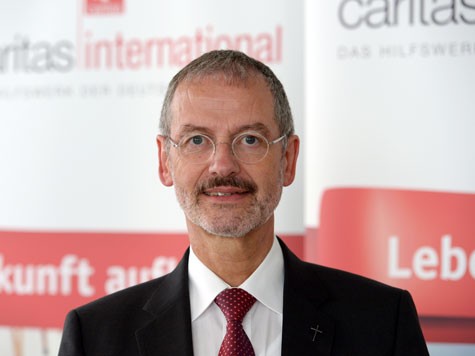CHURCHES IN BRIEF

Germany: Caritas, Msgr. Neher re-confirmed at the helm After twelve years at the helm of Caritas Germany (DCV), its president, Msgr. Peter Neher was re-elected for a third mandate by national delegates during their Assembly of October 13 in Regensburg. A large majority of 190 delegates from various diocesan Caritas decided to continue pursuing the commitments linked to new social and political conditions in Germany on the wake of Neher’s commitments as DCV chair during his first two mandates. Looking ahead to 2020, Caritas Germany will discuss personnel management and the organizations linked to the association. In particular, increasing attention will be given to sick people, to their needs and to the possibility of networking for cooperation at national level. “I firmly believe that Caritas should act as a social and social-political player, supporting with special means all those living on the margins of society from the beginning to the end of their lives”, Neher said during the Assembly, praising the cooperation between local and diocesan Caritas and associations of professionals and volunteers: “along with many other people in parishes we call upon men and women, professionals and volunteers of Caritas to give their full availability to find solutions to the questions and problems on the horizon, for example as regards the difficult situation of refugees”, Neher said. Belgium: the bishops’ appeal, “welcome the migrants” “A Country cannot refuse to welcome people in need. Our attachment should always be based on reception and respect regardless of mutual differences. On this aspect the bishops make no concessions”. It is the opening phrase of a statement signed by Belgian Bishops, published a few days ago, dedicated to migration. The prelates appealed to governments “to open their borders and implement solid reception policies”. They equally invited parishes and associations to “make empty homes and apartments” available for the migrants. “The refugees as well as all those compelled to leave their native Countries have no other choice. They seek security. They cannot feel forced to lie; to invent stories or to change their religion to ensure their reception. Priority must be given to the most vulnerable, not to those with better economic situations”. The bishops acknowledged the “trust” marking the response of numerous Christian and non-Christian citizens to the migrant situation, but they called upon the population “not to give in to fear, to misunderstanding”. They urged governments to step up efforts in the fight “against the cause of these forced migration waves in the Countries of origin” and asked Belgium for a “significant” increase in the contribution to developing Countries. Poland: Assembly of Gniezno, “Europe of new beginnings” How to be present as Christians in the world, to proclaim Christ and show his greatness: these are the themes of the tenth Assembly in Gniezno scheduled for March 11-13 2016 in the first capital of Christian Europe. The purpose of the meeting with the title “Europe of the new beginnings” presented to the press by the primate of Poland, archbishop of Gniezno, monsignor Wojciech Polak, “is to help understand that today we are facing important challenges for the future”. The prelate pointed out that the Assembly will try to “reread Christian reality through the lenses of freedom promoted by a new beginning” that “in the personal and spiritual dimensions alike” stem from baptism. However, this freedom “should not be understood as “freedom from sin and from our weaknesses”, but as “creative freedom that makes it possible to build together our social and ecclesial life”, the archbishop pointed out. The Assembly is part of the celebrations marking 1050 years of Christianity in Poland. The first sovereign of Poland, Mieszko I, was baptized in 966. In the year 1000 was held the first Assembly of Gniezno. The then emperor Otto III of Saxony met in Gniezno the successor of Mieszko I, Boleslao the Brave.